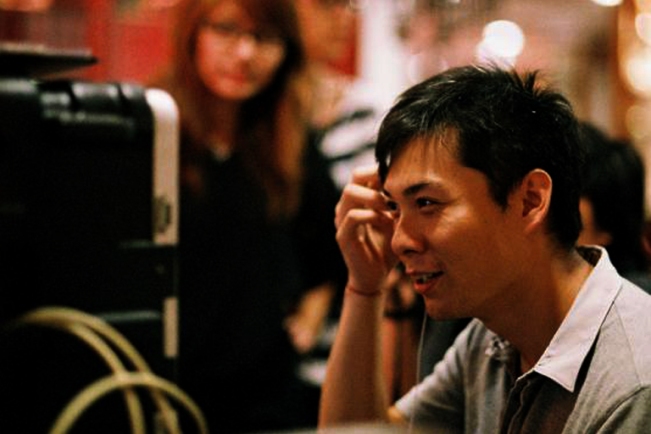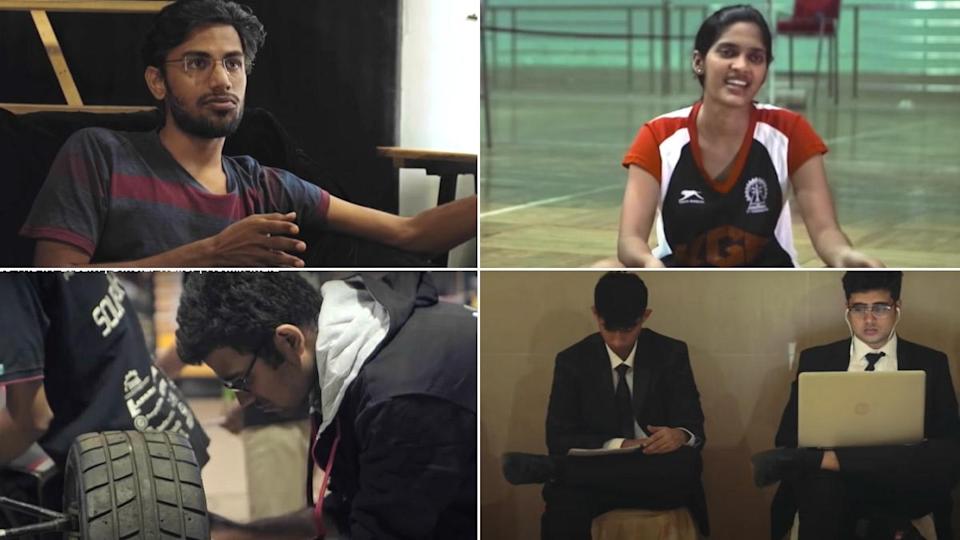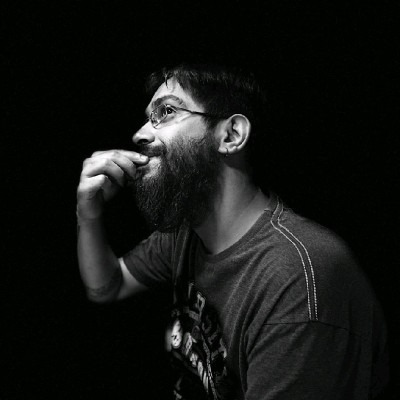BY TANUL THAKUR
Anthony Chen, 29, is a Singaporean director, writer, and producer. After graduating from the School of Film and Media Studies, Ngee Ann Polytechnic, in 2001, Chen made a number of short films. His first short, G-23 (2005), screened at the 59th Festival de Cannes. His next, Ah Ma (2007), was nominated for the Short Film Palme d’Or at the 60th Cannes International Film Festival, and received a special mention at the festival. His third short, Haze (2008), was nominated for the Golden Bear for Best Short Film at the 58th Berlin International Film Festival. In 2013, Chen made his first feature film, Ilo Ilo, a family drama centered on the relationship between a 10-year-old Singaporean kid and his Filipino maid. The film screened at the Directors’ Fortnight at Cannes, where Chen won the Caméra d’Or (an award for best first feature film). Ilo Ilo has since travelled to various prestigious film festivals around the world: Toronto, London (where it also won the Best First Film award), Busan, among notable others.
In this interview, Chen talks about his debut film’s success (and what it means for Singaporean cinema), how the culture of cinema in his country has changed over the last few years, his primary concerns as a director, the luxury of personal narratives, filmmaking being ‘sexy’, and much more.
You are the first Singaporean filmmaker to win an award at the Cannes International Film Festival. What does this recognition mean for Singaporean cinema?
There’s a spotlight for sure on Singapore now. All the people, especially in Europe, are interested in what else might come from Singapore. I think it’s going to open a lot of doors for other filmmakers of my generation and those younger than me for them to find funding, co-producers, and allow them to make the films they want to make. Singapore is a small country; we make about 10 movies a year. Now, there’s a bit more. And out of those 10 films, nine are usually slapstick comedies or horror. So what I have made is very unusual for Singaporean cinema, and it’s definitely a different voice, a different sensibility.
The last five years of Singaporean cinema have been quite fruitful: My Magic competed for the Palme d’Or in 2008; Sandcastle was screened at Cannes’ International Critics’ Week, in 2010; Ilo Ilo won the Camera d’Or this year. One can clearly see a gradual change in the kinds of films that have been coming out from the country.
There have been a lot of young directors coming up who are intelligent, perceptive, and who are very interested in cinema—ones who love and consume a lot of films, who are very fluent with its language. And they are starting to make a lot of shorts and ultimately their first feature films. And I think the next three-five years would be very exciting for Singaporean cinema because there might be a whole new wave of films if directors are being supported in the right way in terms of funding, resources, being able to work with the right people.
Do you think the culture of cinema watching in Singapore has also evolved in the last few years?
I am not sure if the culture is evolving, that’s the problem. We used to have an international film festival (Singapore International Film Festival), which went over for more than 20 years and then it stopped. Because it was losing money every year. So I am not sure whether the culture is growing in the country. Now we have lesser interesting foreign and art-house films coming into Singapore compared to maybe quite a number of years ago. Also, the art-house climate all the over the world is getting more and more difficult because of Hollywood films.
What do you attribute the widespread success of Ilo Ilo to? Because, on the surface, the film doesn’t appear obviously universal, as the concept of a live-in maid is still very Asian. What do you think helped the film transcend the local cultural barrier?
I always thought that the film was very culturally specific, very Asian. But when we had our premiere in Cannes, I realized everyone—people from France, Spain, Portugal—understood the film. We had a North American premiere recently at the Toronto International Film Festival, and people just got it. I think it’s because the themes of immigration, family, growing up, struggling with money and finance, parenthood and relationship are very universal. In fact, the Americans were telling me: ‘This film could have been set in America. Just that the maid would have been Mexican.’ There’s a different version of Ilo Ilo in every country. In India, for example, the maid could have belonged to a different social class. In a way, people connect with it because the key thing about the film is that there’s so much humanity in it. I also think that the film has a certain honesty and sincerity. It’s not pretentious; it doesn’t try to show off amazing cinematography. It’s so back to the basics that it feels genuine.
In Ilo Ilo, and also in your short films (Ah Ma, Homesick…), you have explored the fragile household and the kind of conflicted relationship it shelters. What are your primary concerns as a filmmaker?
I am interested in people, the dynamics of the relationship between people, the human condition. I am also interested in real, flawed characters. Because all characters are flawed; there’s no perfect person. We all have, at times, our follies, greed, vices and lust. I am interested in characters; I am actually less interested in plot. I am not interested in creating devices so you have one turning point, one big dramatic event happening.
You have said that you have an obsessive streak to you while you are making a film. There are many scenes in Ilo Ilo where you went to great lengths to maintain their authenticity. Actress Yeo Yann Yann recently said this in an interview: “Every tiny thing in Anthony’s film is thought through. Nothing is accidental.” Having said that, how open are you to improvisation or external suggestions while making a film?
It’s true. Everyone knows that I am a bit of a control freak. Once I reach a certain point during the filming process, when it feels right, I can be quite dogmatic. I don’t allow my actors to change even a single word of my dialogue. Because I feel there’s a certain rhythm that’s working already. Also, I rarely improvise. However, if something isn’t working then I might have to change it, because that’s what filmmaking is. A lot of time the filmmaking is about your gaze, your perspective, on how you see the world. And if it clicks and it feels right, it works. But when it doesn’t you tweak it.
At first, Ilo Ilo appears to revolve around a preteen boy, but, ultimately, it’s much more than that. As the film unfolds, we see the world through different characters—the Filipino maid (the racial and the class tension), the father (the weight of responsibility)—and different themes come to the fore. Did you want to explore these motifs before you began writing or filming or you discovered them during the process of making the movie?
My writing process is very organic. I find things slowly. But I don’t start with a theme. In fact, in a way, I wanted to paint a very authentic, honest portrait of that period of time, of growing up in a certain family, with certain people. And that was it. And it so happened that some of these motifs then become a part of the portrait because this is my portrait of the country, and this country is like that. But it’s not like, ‘Oh! I want to talk about this and I want to talk about that. And I then I am going to plant it in my film.’
Ilo Ilo is also partly autobiographical. What kind of a privilege does a personal narrative provide you?
Since the early times of cinema, a lot of very good films have been personal. And I think it’s important to start personal not because you are making a biography of your own life, but because you need to understand what you are exploring. It’s very hard for me to explore something that’s too far from what I know. I can’t explore rape and murder because I have no personal connection with it. So it’s important to start with subjects, emotions, and things that you know about. Because it’s territory and material that you can handle. And that in a way is an advantage. A lot of times when the first films try to tackle very big issues, you can smell that the film is not honest. Something isn’t right, that this person is trying, trying too hard.
Serendipity, too, played a crucial part in Ilo Ilo. You had cast Yeo Yann Yann and then got to know, just before the filming began, that she became pregnant. And then you had to rewrite her character and, ultimately, the script, something that enriched the film. How do you reflect on that?
Filmmaking is a medium where you want a lot of control as a director. Because you want to control the script, the performances, lighting, shot, everything. But filmmaking is also a medium where you lose complete control. Because if you want to shoot on a sunny day and it happens to rain and you have no money to shoot on the other day. Do you shoot? You have to. If something happens and the actor falls ill, or the machine breaks down and you need to redo something, you will do it. I think it’s very important for me now to embrace the journey, and a lot of time you spend the first few days being frustrated: ‘Why is this happening? This is so shit.’ But, in the end when you start appreciating that there’s a reason why this is happening, [you say] let’s see how we go with it. Perhaps then something new will come out of the process, something else will come out of the process. And usually it will be a better film.
You wanted to make movies since you were 15, when there was only one film school in Singapore. How is the situation different now?
A lot of film schools have cropped up in the country now: NYU (New York University) Tisch School of the Arts Asia; the Puttnam School of Film. We also have film schools in various universities, at different levels. Many Singaporeans also get trained abroad in multimedia and video. In a way, there’s more opportunity now. But that doesn’t translate into better films or filmmakers. Eventually, filmmaking is not as much about having the tools or opportunity. It’s also about having one’s own sensibility, and how much one really wants to make cinema.
What do you think has propelled that change? From having just one film school to film schools slowly mushrooming in the country?
Because filmmaking has become such a sexy subject. Right now, we are in a new economy. In the past, everyone wanted to be a doctor, engineer or lawyer. But now everyone wants to be cool. And being a filmmaker is cool. For someone young, it’s probably more cool to introduce himself as ‘Hi! I am a filmmaker’, rather than ‘Hi! I am engineer.’ And that’s actually very dangerous because a lot of young people think going to film school as being very glitzy—you get to meet the actors, you get to walk the red carpet, you have the lights, camera and all that, but the truth is that they don’t know it’s a lot of pain, it’s a lot of bullshit—late hours, being very poor, struggling, and trying to get things, props, people, actors. It’s so easy to package filmmaking and cinema as a very sexy thing. And every film festival does that. Every festival wants to make it something that’s very glitzy, prestigious. There will be lots of awards, a big opening night. So, unfortunately, it’s a very good medium to make things sexy, but is it really sexy? I am not quite sure.
You have become a poster boy for Singaporean cinema. What are your expectations from your country’s cinema in years to come?
I would like Singaporean cinema to have a more diverse range of voices. And not limit itself to a certain genre. There should be more voices coming from Singapore because as you can see from Ilo Ilo, we are such a multi-racial, multi-cultural society, and we should embrace that. I am looking forward to Singapore building itself as a certain brand internationally in terms of audiences appreciating and recognizing Singapore cinema in a way Korean, Japanese, Hong Kong cinema has done. Even Bollywood cinema has made a name for itself. Everyone knows it.
But people definitely don’t know Bollywood for the right reasons.
Well, everyone knows that it’s very successful.
In a very commercial way. But, yeah, I see your point.
So I think I am looking forward to that day and hopefully that day will come [when Singaporean cinema will be known world over].
You are just one film old; where do you see yourself going on from here on now, both in terms of content, style, and form?
I want to be an international filmmaker. I don’t want to be just an Asian filmmaker. But I don’t want to be a Hollywood filmmaker either; that would probably be the last thing I would want to be. My next film would probably be made in the U.K., in English, with British actors. I believe cinema is universal, and I am a huge fan of Ang Lee. And that’s the kind of role model I am looking up to. And I think it’s possible. A lot of times, especially in a continent like Asia, people dismiss you by saying, ‘Oh! It’s not possible.’ But I think even this small little film has done a lot of things that people had said was not possible. Everyone had said that it’s not possible that Singapore can make a film that people can relate to and connect with.
How has Ilo Ilo been received in Singapore?
The reactions have been good. It’s done rather well at the box-office. In fact, it’s probably the most successful independent Singapore film. The reactions by the Singaporean people have been very encouraging. Compared to My Magic, Sandcastle, the box-office of this film is almost 20 times more. Because those films opened in one screen, but this film has opened in 15 screens. So in a way it has opened a new chapter in Singaporean cinema. But, at the same time, some of the worst comments on the film have come out from Singapore, too: ‘Oh! It’s so boring’; ‘There are no big, fancy shots’; ‘It doesn’t make me cry, cry, and cry. I expected the ending to be so moving.’ They were expecting a huge sentimental melodrama. There were expecting something else. So, in a way, a lot of people [in Singapore] have not seen something like this before. It’s their first time. But in a way again that’s the process where change happens, a process where a country grows in terms of its taste and sensibility.
Tanul Thakur is an award-winning freelance journalist, formerly of The Sunday Guardian and The Big Indian Picture. He blogs at tanulthakur.wordpress.com









Leave A Comment
You must be logged in to post a comment.